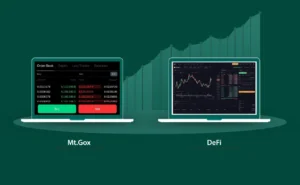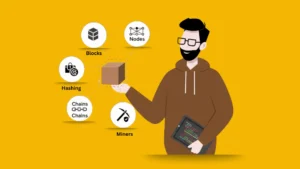
Cryptocurrency exchanges are essential for anyone looking to buy, sell, or trade cryptocurrencies like Bitcoin and Ethereum. As more people become interested in digital currencies, the demand for trading options is increasing. In this article, we’ll explore what goes into building a crypto exchange, the wide range of features offered by blockchain experts, and the essential elements that make a trading platform secure, efficient, and user-friendly.
What is a Cryptocurrency Exchange?
A Cryptocurrency Exchange is a platform that allows users to buy, sell, or trade cryptocurrencies. Think of it as a marketplace for digital currencies, similar to a stock exchange for shares. Users can create accounts on these platforms, deposit funds, and then use those funds to purchase various cryptocurrencies like Bitcoin, Ethereum, or Litecoin.
There are two main types of exchanges: Centralized and Decentralized. Centralized exchanges act as intermediaries between buyers and sellers, providing a user-friendly interface and customer support. However, users need to trust these platforms with their funds. On the other hand, decentralized exchanges (DEXs) operate without a central authority, allowing users to trade directly with one another. This approach offers greater privacy and control but can be less user-friendly for beginners.
Centralized Exchange Creation
Creating a platform for users to trade digital currencies involves several key steps. It starts with planning the features and design as part of centralized exchange creation to meet user needs. Experts then build the software and set up a secure and efficient backend to handle transactions. Strong security measures are crucial to protect users’ funds and personal information because exchanges often attract hackers. The platform must also follow regulations in the areas where it operates. Once built, the exchange undergoes extensive testing to identify and fix any issues before launching. This process is essential for providing a safe, reliable, and user-friendly environment for trading digital assets.
Types of Cryptocurrency Exchange Creation
Centralized Exchanges (CEX)
These are the most common types of exchanges. They act as intermediaries between buyers and sellers, making transactions easier and faster. Users must create accounts and trust the platform to manage their funds. Examples include Binance and Coinbase.
Decentralized Exchanges (DEX)
Unlike centralized exchanges, DEXs allow users to trade directly with one another without a middleman. This offers greater privacy and control over funds. However, they can be less user-friendly and may have lower trading volumes. Examples include Uniswap and SushiSwap.
Hybrid Exchanges
These combine features of both centralized and decentralized exchanges. They offer the convenience of centralized trading with some advantages of decentralization, like increased security and user control.
Peer-to-Peer (P2P) Exchanges
These platforms connect buyers and sellers directly, allowing them to trade cryptocurrencies without intermediaries. P2P exchanges often facilitate transactions through escrow features to enhance security. Examples include LocalBitcoins and Paxful.
Brokerage Exchanges
These platforms simplify the buying process by allowing users to purchase cryptocurrencies at a set price. They often provide a user-friendly interface, making it easier for beginners to get started.
Token Exchanges
These exchanges focus specifically on trading tokens created on various blockchain platforms. They allow users to trade a wide range of digital assets, including utility and security tokens.
Steps Involved in Building a Crypto Exchange
Consultation and Planning
This is the first step where experts talk to the client to understand their needs and goals. They help decide what kind of exchange to create—like a centralized one (controlled by a group) or a decentralized one (run by users). They also discuss important features and rules to follow.
Building the Exchange Software
In this stage, experts create the actual trading platform. This includes making the backend (the system that handles all transactions) and the frontend (what users see and interact with). The goal is to make the platform fast, secure, and easy to use.
Adding Wallets
Users need a place to store their cryptocurrencies safely. Experts either create new wallets or link existing ones to the exchange. They ensure these wallets can handle various types of cryptocurrencies and are secure.
Security Features
Protecting users’ money is very important. Experts add features like two-factor authentication (2FA) and encryption to keep everything safe. They also regularly check for any vulnerabilities to keep the platform secure from attacks.
Liquidity
To allow easy trading, the exchange needs to have enough buy and sell orders. Experts help maintain good liquidity, which means having enough people willing to trade at any time.
Payment Options
Users should be able to easily deposit and withdraw money. Experts integrate different payment methods, like credit cards, bank transfers, or other cryptocurrencies, to make transactions smooth.
User-Friendly Design
A good design attracts users. Experts work on making the platform easy to navigate and visually appealing. They gather feedback to improve the design based on what users like.
Mobile Apps
Many people prefer trading on their phones, so experts create mobile apps for both Android and iOS. These apps should have the same features as the website but be easy to use on smaller screens.
Following the Rules
Exchanges must operate legally. Experts help ensure the platform meets all necessary regulations, like verifying users’ identities and monitoring transactions for any suspicious activity.
Tech Used to Build Cryptocurrency Software
Building digital asset trading platforms requires various technologies that ensure scalability, security, and a good user experience. At its center, blockchain technology is key. It uses consensus algorithms like Proof of Work (PoW) and Proof of Stake (PoS) to validate transactions. For these platforms, strong backend systems are created with programming languages like Java, Python, and C++. These languages are important for managing high-frequency trading and order processing.
Frontend creation often leverages frameworks like React or Angular to create user-friendly interfaces. Decentralized exchanges (DEXs) utilize smart contracts with languages like Solidity on platforms such as Ethereum or Binance Smart Chain. To manage user data and transactions efficiently, databases like MongoDB and PostgreSQL are employed.
Cloud platforms like AWS or Azure provide the necessary infrastructure for hosting, while security measures—including cryptographic protocols, Two-factor Authentication (2FA), and multi-signature wallets—are integrated to safeguard transactions and user information. Additionally, APIs play a critical role in facilitating seamless interaction between various software components, enhancing the functionality of digital currency exchange platforms. Overall, a combination of these technologies creates a comprehensive, secure, and efficient environment for cryptocurrency trading.
Why Choose Nadcab Labs for Centralized Exchange Creation
Nadcab Labs is an excellent choice for creating your digital token exchange. Our skilled team has extensive knowledge of blockchain and cryptocurrencies. We focus on building secure, high-quality platforms that meet your needs. Security is our top priority. We use sophisticated protection methods to keep your exchange safe from threats. We believe in transparency, so we keep you informed throughout the process. This way, you’ll know what’s happening at every step.
After your exchange is up and running, we continue to support you, helping you deal with any issues that might come up. Our innovative approach means we use the latest technology to make sure your users have a smooth and enjoyable experience. Whether you’re just starting or want to improve an existing exchange, Nadcab Labs is here to help you succeed with expert support and comprehensive features.






